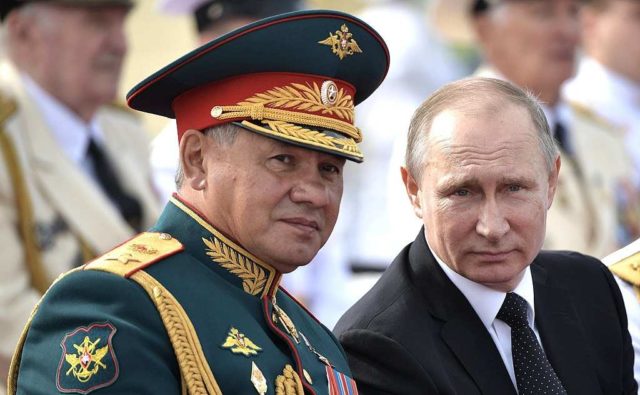
Russia threatens ‘direct military confrontation’ with US over Ukraine Russian Defence Minister Sergei Shoigu and President Vladimir Putin (Russian Presidential Press and Information Office/Released)
A Russian official warned last week that the efforts by the U.S. and other western nations to arm Ukraine against Russia’s invading forces puts them at risk of a “direct military confrontation” with Russia.
Russian Ambassador to the U.S. Anatoly Antonov told Newsweek late Friday that “Western states are directly involved in the current events as they continue to pump Ukraine with weapons and ammunitions, thereby inciting further bloodshed.”
Antonov’s comments come after around a month and a half of fighting between Russian invasion forces and Ukrainian defenders. Even before the fighting began, the U.S. and other western nations had sent hundreds of anti-tank and anti-aircraft launchers to Ukraine. The U.S. and members of the North Atlantic Treaty Organization (NATO) have continued to send weapons to Ukraine throughout the ongoing fighting.
Last week, the U.S. supplied another $300 million worth of weapons to Ukraine, including advanced Switchblade-600 loitering munitions that can fly above the battlefield scanning for targets before diving into them and exploding. The new Switchblade-600 drones are more powerful than their Switchblade-300 predecessors and can take out enemy tanks.
“We warn that such actions are dangerous and provocative as they are directed against our state,” Antonov said. “They can lead the U.S. and the Russian Federation onto the path of direct military confrontation.”
“Any supply of weapons and military equipment from the West, performed by transport convoys through the territory of Ukraine, is a legitimate military target for our Armed Forces,” Russia’s ambassador to the U.S. added.
Other Russian officials in recent weeks have also threatened to target weapons transports to Ukraine. In March, Deputy Foreign Minister Sergei Ryabkov said that the “thoughtless transfer” of Western weapons to Ukraine represented an “escalatory component of Washington’s policy.” Ryabkov said Russian forces could attack those weapons shipments. Days later, Russian Foreign Minister Sergei Lavrov reiterated his deputy’s remarks, stating, “Any cargo moving into the Ukrainian territory which we would believe is carrying weapons would be fair game.”
Russian forces have carried out multiple strikes in western Ukraine, landing within a few miles of NATO-allied countries. On March 13, Russian missiles struck a Ukrainian military base near the city of Yavoriv, where Ukrainian forces have been training with foreign volunteers comprising Ukraine’s International Legion. The sprawling Ukrainian military base stretches within 10 miles of the NATO-allied nation of Poland.
On March 19, Russia claimed it deployed an air-launched Kinzhal hypersonic missile, which targeted an alleged Ukrainian weapons depot located near Deliatyn. The Ukrainian village is located about 46 miles from Ukraine’s border with Romania, and about 88 miles from Ukraine’s border with Hungary. Romania and Hungary are both members of the NATO alliance.
It is unclear how Russia will strike weapons shipments flowing into Ukraine from the west since the Russian military announced it would shift its forces to Ukraine’s eastern Donbas region.
Despite Russia’s shifting war objectives, Antonov said Russia’s demands for a settlement to the conflict remain the same, “including the demand for an unconditional consideration of Russia’s security interests, the demilitarization and denazification of the Ukrainian state, ensuring its neutral and non-nuclear status as well as the recognition of Russian sovereignty over Crimea and the independence of the Donetsk and Lugansk People’s Republics.”




